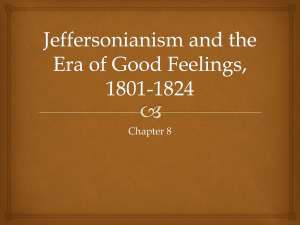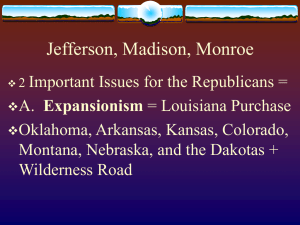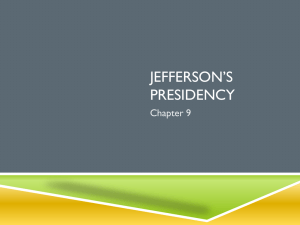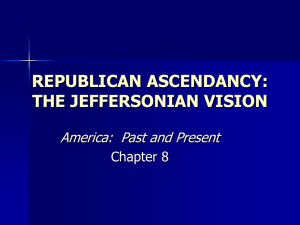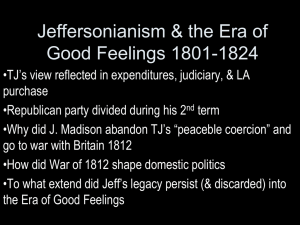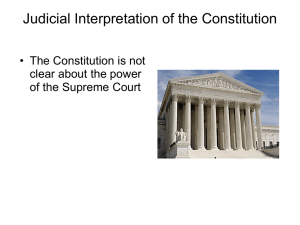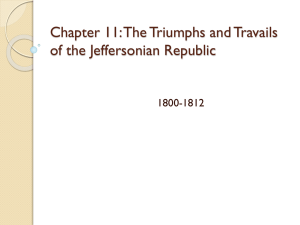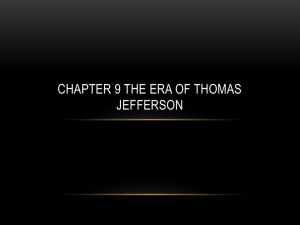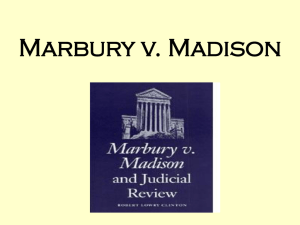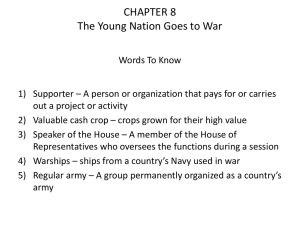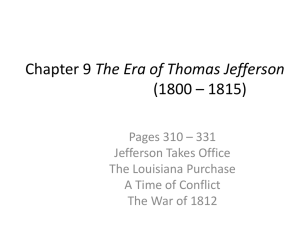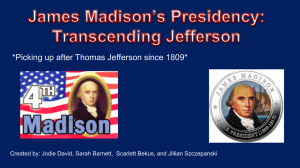The Jefferson Era
advertisement
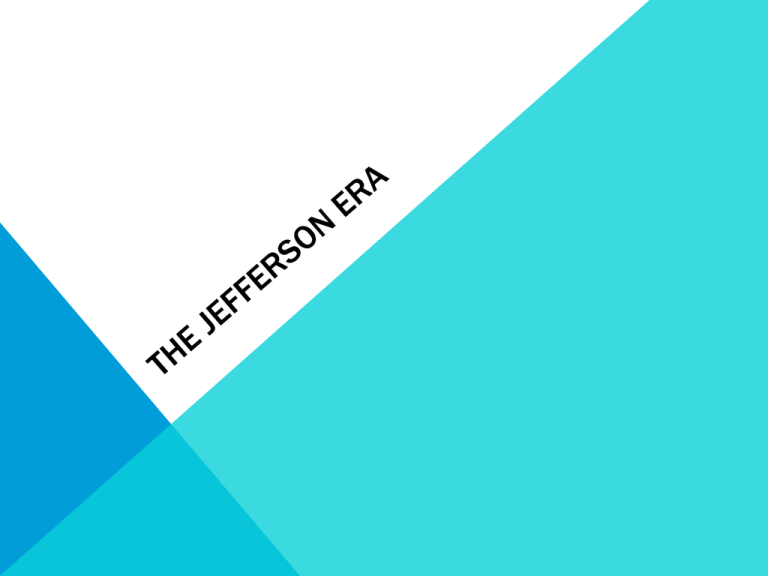
BEGINNING OF THE NEW SEMESTER What is coming up… 7th grade iLEAP!! iLEAP review packet 2 GRADE 7 ILEAP SOCIAL STUDIES ASSESSMENT STRUCTURE 3 BELLRINGER…SORT OF Place the following events in order (timeline) and add a brief description of the significance of each The Battle of Yorktown United States Constitution written French and Indian War Pilgrims sign Mayflower Compact The Battles of Lexington and Concord Navigation Acts passed to support system of Mercantilism George Washington elected to presidency The Declaration of Independence drafted and signed The Stamp Act passed The Intolerable Acts passed Articles of Confederation written 4 EVENTS IN ORDER… 1. Pilgrims sign Mayflower Compact 2. Navigation Acts passed to support system of Mercantilism 3. French and Indian War 4. The Stamp Act passed 5. The Intolerable Acts passed 6. The Declaration of Independence drafted and signed 7. The Battles of Lexington and Concord 8. The Battle of Yorktown 9. Articles of Confederation written 10.United States Constitution written 11.George Washington elected to presidency 5 NOW WHAT…THE ELECTION OF 1800 Who are the political parties? Who are the candidates? Who do you want to win??? 6 ELECTION POSTERS • Partner Activity • Each group will be assigned to either the Federalist Party of the DemocraticRepublican Party • You will be creating a campaign poster for the candidates from your political party • Poster should include: • Name of your party • Names of your candidate(s) • Reasons your candidate(s) should be elected • Reasons why your opponent should not be elected • A picture to go along with your poster, and COLOR! 7 WINNER…? • Thomas Jefferson and Aaron Burr each received 73 votes, so who won? • Vote went to the House of Representatives, where it also tied • 36 votes later, Thomas Jefferson was elected to the Presidency of the United States • How to fix this problem? • Twelfth Amendment – this amendment created a separate ballot for president and vice president 8 SIGNIFICANCE OF THE ELECTION OF 1800? 12th Amendment And… First time political power in the US had peacefully changed from one party to another 9 MARBURY V. MADISON • Recap – Judiciary Act of 1789 • Created the three levels of federal courts and defined their powers and relationship to the state courts • Democratic-Republicans controlled the Presidency and Congress, but the Federalists still controlled the Judiciary • Adams had appointed several judges at end of term (“midnight judges”) • Jefferson and his Secretary of State, James Madison, refused to accept some of the appointments • William Marbury sued Madison, asking the Supreme Court to enforce the appointment by Adams 10 MARBURY V. MADISON • John Marshall, the Chief Justice of the United States, wrote the US Supreme Court Decision for the case • Marshall stated that Jefferson should have honored the appointments, but the court had no power over Jefferson in this manner because the Judiciary Act of 1789 was unconstitutional. • Marbury v. Madison did several things • Avoided confrontation between Executive and Judiciary • Strengthened the Supreme Court • Established the court’s power of Judicial Review – the power to declare an act of Congress unconstitutional. 11 VERBAL RECAP…. 12 HOMEWORK… Read Sections 11.7 and 11.8 from History Alive! 13 DO NOW… Take your seat quietly, then take out your Social Studies binder and turn to the notes we started taking last class. 15 BELLRINGER… The first person to raise their hand and correctly tell me what the Judiciary Act of 1789 established will get a candy… Judiciary Act of 1789 Created the three levels of federal courts and defined their powers and relationship to the state courts. And… Established that the President would nominate candidates for federal judgeships . 16 MARBURY V. MADISON • Recap – Judiciary Act of 1789 • Created the three levels of federal courts, defined their powers and gave president job of appointing federal judges • Democratic-Republicans controlled the Presidency and Congress, but the Federalists still controlled the Judiciary • Adams had appointed several judges at end of term (“midnight judges”) • Jefferson and his Secretary of State, James Madison, refused to accept some of the appointments • William Marbury sued Madison, using Judiciary Act of 1789 to ask the Supreme Court to enforce the appointment by Adams 17 MARBURY V. MADISON • John Marshall, the Chief Justice of the US, wrote the US Supreme Court Decision for the case • Decision: Jefferson should have honored the appointments, but the court had no power over Jefferson in this matter because the Judiciary Act of 1789 was unconstitutional. (Unconstitutional b/c it expanded powers past those listed in Article III of Constitution) • Marbury v. Madison did several things • Avoided confrontation between Executive and Judiciary • Strengthened the Supreme Court • Established the court’s power of Judicial Review – the power to declare an act of Congress unconstitutional. 18 THOMAS JEFFERSON VIDEO QUIZ 19 THE LOUISIANA PURCHASE The Port of New Orleans, located at the mouth of the Mississippi River, was a very important port for northern states like Ohio, Kentucky and Tennessee These states depended on the Mississippi and Ohio Rivers to trade their products to other markets. Spain controlled the Port of New Orleans and the Louisiana Territory. After years of unsuccessfully trying to control trade and keep out American settlers, Spain decided to sell the territory to France and make it their problem. When the Port of New Orleans was closed in 1802, Thomas Jefferson sent Robert R. Livingston and James Monroe to France to by New Orleans. What happened next?? 20 THE LOUISIANA PURCHASE: SKIT • You will be split into groups • Your group will be creating a skit about the Louisiana Purchase • Skit should start with France’s acquisition of the LA Territory and finish with Congress approving the LA Purchase • Skit should contain the necessary and appropriate information needed to tell the story of the LA Purchase (use the textbook!!) • Use a narrator to guide the story, and divide the parts among the group as needed • Skits will be presented before the end of class! 21 EXPLORING THE LOUISIANA TERRITORY Meriwether Lewis and William Clark Lewis and Clark Expedition Zebulon Pike Pikes Expedition 22 HOMEWORK Complete worksheet titled “Pike Explores the Southwest” 23 EXIT QUIZ 24 DO NOW… Get out your social studies binder and turn to the Bellringer! Section of your binder Get out your homework to turn in and pass it down to the end of the row to be collected 26 BELLRINGER…. In your own words, tell me how each of these pairs of terms is significant to American History in the early 1800s: - The Federalist Party and the Democratic-Republican Party - Thomas Jefferson and Aaron Burr - William Marbury and James Madison - Robert Livingston and James Monroe - Meriwether Lewis and William Clark 27 THE LOUISIANA PURCHASE AND WESTERN EXPEDITIONS Page 273 28 THE LOUISIANA PURCHASE: POLITICAL CARTOON Worksheet to be completed individually 29 POLITICAL CARTOON: CREATE YOUR OWN Each person will create a political cartoon. Can be an individual cartoon or a comic strip. Topics for the cartoon include the following: - The Election of 1800 - The court case of Marbury v. Madison - The Louisiana Purchase - The expedition of Lewis and Clark or Pike’s Expedition Cartoon should be relevant, historically accurate, and colorful/presentable! 30 THE COMING OF WAR… When war b/w Britain and France occurred in 1803, each side wanted to stop America from helping the other. British searched American ships, forced British runaways to return to the Navy, and even began strategy of impressment (the practice of forcing people to serve in the army or the navy) Jefferson’s Answer: The Embargo Act of 1807 (fails terribly!) Congress’s Answer: The Non-Intercourse Act of 1809 (only bans trade with GB, France, and their colonies; law was still unsuccessful) 31 THE COMING OF WAR… American settlers in the 1800s kept pouring into the Northwest Territory, even if Native Americans were there British agents from Canada started to arm Native Americans living among western frontier One Shawnee chief, Tecumseh, believed the Native Americans needed to unite to beat the Americans 32 THE COMING OF WAR William Henry Harrison, governor of Indiana Territory, warned Tecumseh not to resist the power of the Americans When Tecumseh left his village to gain followers, Harrison attacked and defeated Tecumseh’s followers – The Battle of Tippecanoe Even though Tecumseh was defeated, the fact that the British were arming Native Americans still enraged Americans 33 WAR OR NOT TO WAR?! Read “The War Hawks” and “The Opposition” on pages 282 and 283 from the Red Textbook Take one of the sides – War Hawk or Opponent of War Write a paragraph explaining why you believe America should or should not go to war. Make sure to back up your argument with legitimate reasons. 34 QUIZ TIME… 35 HOMEWORK Define the following vocabulary terms and people: Marbury v. Madison, Judicial Review, Louisiana Purchase, Lewis and Clark Expedition, Impressment, Embargo Act 1807, Non-Intercourse Act 1809, Battle of Tippecanoe, War Hawks 36 DO NOW… Get out your social studies binder and turn to the Notes Section of your binder Get out your vocabulary homework to be checked 38 CONFLICT BETWEEN MAJOR POWERS Who are the major world powers? Major powers in the US? What usually happens when something good happens in the US…? 39 THE COMING OF WAR… When war b/w Britain and France occurred in 1803, each side wanted to stop America from helping the other. British searched American ships, forced British runaways to return to the Navy, and even began strategy of impressment (the practice of forcing people to serve in the army or the navy) Jefferson’s Answer: The Embargo Act of 1807 (fails terribly!) Congress’s Answer: The Non-Intercourse Act of 1809 (only bans trade with GB, France, and their colonies; law was still unsuccessful) 40 THE COMING OF WAR… American settlers in the 1800s kept pouring into the Northwest Territory, even if Native Americans were there British agents from Canada started to arm Native Americans living among western frontier One Shawnee chief, Tecumseh, believed the Native Americans needed to unite to beat the Americans 41 THE COMING OF WAR William Henry Harrison, governor of Indiana Territory, warned Tecumseh not to resist the power of the Americans When Tecumseh left his village (Prophetstown) to gain followers, Harrison attacked and defeated Tecumseh’s followers – The Battle of Tippecanoe Even though Tecumseh was defeated, the fact that the British were arming Native Americans still enraged Americans 42 WAR OR NOT TO WAR?! Read “The War Hawks” and “The Opposition” on pages 282 and 283 from the Red Textbook Take one of the sides – War Hawk or Opponent of War Write a paragraph fully explaining why you believe America should or should not go to war. Make sure to back up your argument with legitimate reasons. Process: 1) Start with a main idea statement 2) Defend statement with evidence 3) If possible, show how the opposing side is incorrect 43 WAR OF 1812 Throughout the video, take notes on the people, events, and practices that led to the War of 1812, as well as the events that occurred during the War. 44 HOMEWORK… Read sections 12.6 and 12.7 from History Alive! Use your notes and the textbook to create a timeline of the major events that led to the War of 1812 (Start from France and Britain going to war with each other, end with Madison’s declaration of war) 45 46 DO NOW… After quietly taking your seats, take out your homework from the weekend and your notes on the War of 1812 video from last class. 47 WAR OF 1812 VIDEO 48 WAR OF 1812 VIDEO (RECAP) USS Constitution Large warship used to defend against British Navy Defeated three British ships in a row at one point (First time ever!) Inspired confidence amongst Americans The Battle of Lake Erie Oliver Hazard Perry commanded small US fleet, attacked British on Lake Erie Key position for British; Perry forced British to surrender The Battle of Thames Harrison was able to invade Canada once Lake Erie was taken Harrison defeated a force of British and Native American soldiers Tecumseh was killed, ended Native American contribution 49 WAR OF 1812 VIDEO (RECAP) Fall of Washington D.C. Despite US dominance in the west, things worsened in the east British attacked Washington in April 1814 Madison forced to flee the capital British broke through American defenses, set fire to the White House, the Capitol building, and several other government buildings 50 WAR OF 1812 VIDEO (RECAP) New Orleans British wanted control of major city after taking Washington Andrew Jackson commanded a mix of 4,500 troops composed of African Americans, Choctaw, militia, and pirates British marched on the city, were caught in an open field and quickly eviscerated British casualties: over 2,000; American casualties: about 70 Andrew Jackson became a hero, America saw the battle as a great victory The End of the War After the Battle of New Orleans, word reached the US saying a treaty had been signed…2 weeks before the Battle of New Orleans The Treaty of Ghent was signed in Belgium on December 24, 1814 51 RESULTS OF WAR OF 1812… • Each side returned to the territory they had conquered. • Intense feelings of patriotism were renewed amongst Americans • Native Americans never rose to great power again • American manufacturing saw a boost after the interruption in trade 52 WHAT TO STUDY FOR CHAPTER TEST… Things you should use to study: • Notes you have taken in class • Bellringers from 1/07-1/15 • Homework assignments from 1/07-1/15 • Activities from class • Vocabulary Words • PowerPoint slides • History Alive! Sections 11.711.8, 12.6-12.8 Topics that will be addressed: • The Election of 1800 • The 12th Amendment • Marbury v. Madison • The Louisiana Purchase • LA Territory Explorations • Conflicts that led to War of 1812 • War of 1812 • Aftermath of War of 1812 53 REVIEW GAME Each person create 5 “test questions” to be used Sudden death review game One-on-One review question format Get it right, move on to the next question Last student standing gets an edible prize 54 HOMEWORK For the love of all things holy, STUDY!!!! Makeup: - Read 12.7 from History Alive! Write a brief paragraph explaining why several men in Congress, “War Hawks,” wanted to go to war with Great Britain so strongly. 55
